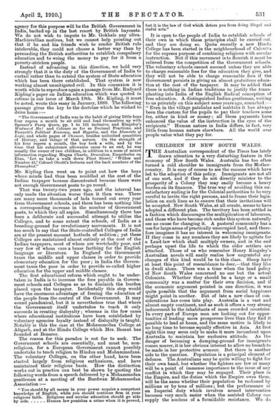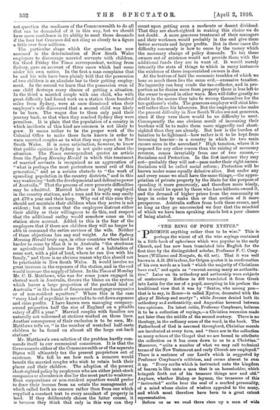CHILDREN IN NEW SOUTH WALES. T HE Australian correspondent of the
Times has lately drawn attention to a very disturbing feature in the economy of New South Wales. Australia has too often turned a cold shoulder to immigrants from the Mother- country. It is easy of course to see the reasons which have led to the adoption of this policy. Immigrants are not all of one sort, and if they do not directly minister to the prosperity of a Colony they may easily become a heavy burden on its finances. The true way of avoiding this un- satisfactor7 ending is for the Colonial authorities to be very careful to invite the right persons, and to frame their legis- lation on such lines as to ensure that their invitations will be accepted. New South Wales, at all events, seems to have adopted a different plan. The territory has been settled in a fashion which discourages the multiplication of labourers, and those who have become rich under this system naturally see no cause for changing it. A pastoral community has a use for large areas of practically unoccupied land, and there- fore imagines it has no interest in welcoming immigrants. If they come in any numbers they are likely to agitate for a Land-law which shall multiply owners, and in the end perhaps upset the life to which the older settlers are attached. Those of us who remember Henry Kingsley's Australian novels will easily realise how ungrateful any changes of this kind would be to this class. Sheep have at least this point of resemblance to deer,—that they like to dwell alone. There was a time when the land policy of New South Wales concerned no one but the actual Colonists. Whether they should be a large or a small community was a matter for their own decision, and if the economic argument pointed in one direction, it was quite possible that the argument from social happiness might point in another. But of late a new class of con- siderations has come into play. Australia is a vast and almost empty continent, and as such it offers a very strong inducement to the inhabitants of more crowded countries. In every part of Europe men are looking out for oppor- tunities of leading more prosperous lives than they find it possible to lead at home, and the same motive is likely in no long time to become equally effective in Asia. At first sight this may seem only to make it more incumbent upon Australia to maintain her exclusive attitude. As the danger of becoming a dumping-ground for immigrants comes nearer, it is her obvious interest to allow no breach to be made in her protective armour. But there is another side to the question. Population is a principal element of defence. The Australians may be quite willing to fight for their own hand, but whether the fighters are few or many will be a point of immense importance to the issue of any conflict in which they may be engaged. Their place in the Empire, and the duties which the Empire owes them, will be the same whether their population be reckoned by millions or by tens of millions ; but the performance of an Imperial duty which involves armed intervention becomes very much easier when the assisted Colony can supply the nucleus of a formidable resistance. We do not question the readiness of the Commonwealth to do all that can be demanded of it in this way, but we should have more confidence in its ability to meet those demands if the four last Censuses did not cling so closely to a figure a little over four millions.
The particular shape which the question has now assumed is the determination of New South Wales employers to discourage married servants with children.
On Good Friday the Times correspondent, writing from Sydney, gave an account of three cases which had come under his own notice. In the first a man complains that he and his wife have been plainly told that the possession of two children is an absolute bar to their getting employ- ment. In the second we learn that the possession even of one child destroys every chance of getting a situation. In the third a married couple with one child, who with great difficulty had found work on a station three hundred miles from Sydney, were at once dismissed when their employer's wife discovered that a second child was likely to be born. The wages due to them only paid their journey back, so that when they reached Sydney they were penniless. It is plain that the population of a country in which incidents of this kind are common is not likely to grow. It seems rather to be the proper work of the Colonial Office to make these facts known in order to warn married couples as to what they may expect in New South Wales. It is some satisfaction, however, to know that public opinion in Sydney is not quite easy about the situation. The Times correspondent quotes an article from the Sydney Morning Herald in which this treatment of married servants is recognised as an aggravation of " what is perhaps the most portentous moral evil of this generation," and as a serious obstacle to "the work of spreading population in the country districts," and in this way weakening " both the developmental and defensive power of Australia." That the process of cure presents difficulties may be admitted. Married labour is largely employed in the country stations, and a man and his wife may easily get £70 a year and their keep. Why out of this sum they should not maintain their children when they arrive is not evident ; but it seems that the employers distrust either their ability or their willingness to do this, and suspect that the additional outlay would somehow come on the station store account. Added to this is the fear of the employers that if there are children they will no longer be able to command the entire services of the wife. Neither of these objections has any real weight. As the Sydney Morning Herald truly says, in other countries where land is harder to come by than it is in Australia "the stockman or agricultural labourer has the use of a habitation of some sort, with a plot of land, where he can live with his family," and there is no obvious reason why this should not be practicable in New South Wales. It would involve no great increase in the expenses of the station, and in the end would increase the supply of labour. In the Times of Monday Mr. C. H. Matthews, who was for some years engaged in clerical work in Australia, throws the blame on the system which leaves a large proportion of the pastoral land of Australia "in the hands of finance and mortgage companies or of non-resident squatters." Where this is the case " every kind of expedient is resorted to to cut down expenses and raise profits. I have known men managing company- owned properties half the size of England on a pitiable salary of £75 a year." Married couples with families are naturally not welcomed at stations worked on these lines. Another consequence of their exclusion is to be seen, Mr. Matthews tells us, "in the number of wretched half-caste children to be found on almost all the large out-back stations."
Mr. Matthews's own solution of the problem hardly com- mends itself to our economical conscience. It is that the Governments either of the Commonwealth or of the separate States will ultimately tax the present proprietors out of existence. We fail to see how such a measure would benefit the married couples -who wish to retain both their places and their children. The adoption of the present short-sighted policy by employers who are either joint-stock companies or absentees is due for the most part to weakness. Even corporations or non-resident squatters would prefer to draw their income from an estate the management of which called forth no censure rather than from one which supplied a constant text to every assailant of property in land. If they deliberately choose the latter course, it is because they think that only in this way can they .count upon getting even a moderate or decent dividend. That they are short-sighted in making this choice we do not doubt. A more generous treatment of their managers and their workmen would probably in the end give them better servants and larger profits. But in these cases the difficulty commonly is how to come by the money which the necessary change of policy demands. To tax these owners out of existence would not provide them with the additional funds they are in want of. It would merely intensify the state of things to which in many instances the existence of these impoverished owners is due. At the bottom of half the economic troubles of which we hear so much there lies the same evil,—excessive taxation. No ingenuity can long evade the tax-collector, and in pro- portion as he drains more from property there is less left to the owner to spend in other ways. Men will differ greatly no doubt in the means they take to recoup themselves for the tax-gatherer's visits. The generous employer will stint him- self rather than his labourers. But the employers who make the present difficulty in New South Wales are not generous, since if they were there would be no difficulty to meet. Consequently the one obvious result of increasing their burdens will be to make them more niggardly and short- sighted than they are already. But how is the burden of taxation to be lightened—how rather is it to be kept from becoming heavier—in a country in which its two main causes seem in the ascendant P High taxation, -where it is imposed for any other reason than the raising of necessary revenue, comes invariably from one of two causes,— Socialism and Protection. In the first instance they may not—probably they will not—pass under their right names. Socialism will be called social reform ; Protection will be known under some equally delusive alias. But under any and every name we shall have the same things,—the appro- priation of private property by the State for the purpose of spending it more generously, and therefore more wisely, than it could be spent by those who have hitherto owned it, and the demand of higher prices from the community at large in order to make this or that section of it more prosperous. Australia suffers from both these errors, and so long as they go uncorrected we fear that the mischief of which we have been speaking stands but a poor chance of being abated.











































 Previous page
Previous page